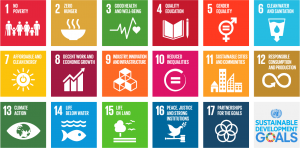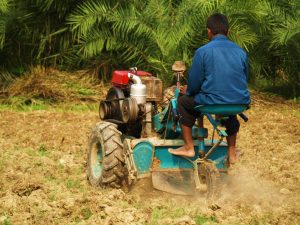 Building on the achievements of the Millennium Development Goals (MDGs), the world community has adopted the 2030 Agenda for Sustainable Development in 2015. The agenda contains 17 Sustainable Development Goals (SDGs) and 169 associated targets. The SDGs focus on five themes--people, planet, prosperity, peace, and partnership. The goals combine all three dimensions of sustainable development covering economic, social and environmental aspects. As UN Secretary General Ban Ki-Moon puts, ‘the new agenda is a promise by leaders to all people everywhere. It is an agenda for people, to end poverty in all of its forms--an agenda for the planet, our common home.’
Building on the achievements of the Millennium Development Goals (MDGs), the world community has adopted the 2030 Agenda for Sustainable Development in 2015. The agenda contains 17 Sustainable Development Goals (SDGs) and 169 associated targets. The SDGs focus on five themes--people, planet, prosperity, peace, and partnership. The goals combine all three dimensions of sustainable development covering economic, social and environmental aspects. As UN Secretary General Ban Ki-Moon puts, ‘the new agenda is a promise by leaders to all people everywhere. It is an agenda for people, to end poverty in all of its forms--an agenda for the planet, our common home.’
A major challenge relating to SDGs in Bangladesh is to put in place effective measures to mobilise resources, capitalise on new financing sources, channel more resources to development activities from private and business sectors using innovative social development models, and re-design the financial markets to ensure financial inclusion for the poor and other financially excluded groups and businesses.
Empirical evidence from Bangladesh strongly suggests that access to financial services enables individuals and businesses to meet unexpected fluctuations in income, smooth cash flows, accumulate assets, and scale up productive investments. Overall, financial inclusion ensures better use of resources and better access to services that ensures higher quality of life. For the government, financial inclusion is an important enabler of development. Considering the universal role of financial inclusion across all nations, improving access to financial services is identified as a cross-cutting target and explicitly recognised in the SDGs. Increasing financial inclusion ensures that formal financial services such as loans,
deposit and saving accounts, payment services and insurance are readily available to households and businesses that they can use these actively and effectively to meet their specific needs. Greater access to financial services is a key enabler for many of the SDGs especially for SDGs1 (no poverty), 2 (zero hunger), 3 (good health and well-being), 4 (quality education), and 10 (reduced inequalities) for households; small and medium enterprises in terms of SDGs5 (gender equality) and 8 (decent work and economic growth) as well as for SDG9 (industry, innovation and infrastructure) and SDG13 (climate action).
Financial inclusion means that all individuals and businesses have access to a full range of useful and affordable financial products and services that meet their needs – transactions, payments, savings, credit and insurance – and are delivered in a responsible and sustainable manner. For Bangladesh, financial inclusion should be comprehensive having at least five dimensions: (i) access to a full range of financial services including credit, savings, insurance, and payments; (ii) financial services are affordable and suitable to the clients and delivered with quality and convenience ensuring dignity and client protection; (iii) clients are capable of making informed and good finance-management decisions; (iv) financial services are available to all who like to use financial services keeping no one excluded and underserved; and (v) there exists a range of providers, a robust financial infrastructure, a clear regulatory framework, and financial services are provided as per the client’s choice through a diverse and competitive financial market.
Research in Bangladesh shows that access to financial services can help achieve the SDGs. Financial inclusion facilitates elimination of extreme poverty (SDG1) by helping the poor people to take control of their economic lives through removing the poverty traps that force people to remain poor. Financial services help the poor people to make investments and manage unexpected emergencies; savings enhance their ability to absorb financial shocks, smooth consumption, accumulate assets and invest in health and education; and help the poor to move out of poverty. Digital financial services help individuals to receive remittances safely and quickly along with financial help from relatives and friends during times of crisis. By reducing poverty, financial inclusion also helps in curbing income inequality.

In Bangladesh, small farmers who have access to financial services invest more in agricultural production than those having no access. This leads to rapid progress in reducing hunger and promoting food security (SDG2). Access to agricultural credit and insurance enables small farmers to make more and riskier investments which also lead to increased earnings for the poor farmers. Digital financial services facilitate distribution of wages, subsidies, social transfers and other benefits to small and tenant farmers and agricultural workers; facilitate better information sharing and support extension services; create opportunities to develop closer interactions with other value chain participants; and save travel time and costs on the part of these poor farmers.
Research in Bangladesh highlights that health related shock is a major determinant of the vulnerability of the poor households and high out-of-pocket expenses on health care are a major reason for the persistence of poverty of many households. Health shocks result in high drainage of their meagre resources; force them to borrow at high costs; and suffer income losses. For achieving good health and well-being (SDG3), saving products can be an important tool in managing medical expenses while micro-health insurance can provide an important avenue for mitigating health related emergencies.
For fostering quality education (SDG4), access to financial services enhances the poor’s ability to invest in learning opportunities and manage education expenses. In particular, financial inclusion of women contributes greatly to promoting gender equality (SDG5) through a number of channels such as economic empowerment and greater control over their finances. Digital financial services make it easier for women-owned businesses and women entrepreneurs to access information and markets and help to lower costs and risks of theft and losses.
Access to infrastructure, in particular water and sanitation (SDG6) and energy (SDG7), is vital to improving the quality of life of the people of Bangladesh. Financial inclusion, especially innovations in digital financial services, significantly increases the access to these essential services by using better technologies, lowering transaction costs and opening up a range of payment options.
For promoting shared economic growth (SDG8) in Bangladesh, financial inclusion is a pre-condition since if the poor and disadvantaged groups remain financially excluded, the foundation for shared growth will be weak and unsustainable. Similarly, for promoting innovation and sustainable industrialisation (SDG9), Bangladesh needs to ensure easy access to credit and other financial services for boosting investments. According to BBS Economic Census 2013, of the country’s 7.8 million enterprises, only 5,300 are large while the vast majority is formal and informal micro, small and medium enterprises (MSMEs). According to InM Microenterprise Diagnostic Survey 2016, most of these enterprises cite limited access to financial services as one of their main constraints to growth and development. The study also reports that credit enhances business start-ups and expansion. Access to financial services allows more entrepreneurs to come forward and innovate, and more enterprises to start creating the foundation for sustainable industrialisation in Bangladesh.
The success in financial inclusion ensures both economic and social prosperity for all making it easier to reduce inequality (SDG10) and promote peace, justice and strong institutions (SDG16). Bangladesh’s policy framework treats finance as a powerful tool of economic growth and future prosperity; and access to finance for the poor is seen as essential for promoting inclusive economic growth and eradicating poverty. In Bangladesh, financial inclusion works as both pro-growth and pro-poor. Since the country’s aim is to achieve ‘a happy, prosperous and enlightened Bangladesh which is free from hunger, poverty, inequality, illiteracy, and corruption and belongs completely to its citizens and maintains a healthy environment (General Economics Division, Planning Commission, National Sustainable Development Strategy 2010-21, 2013), access to finance is an important pre-condition for development. The Seventh Five Year Plan (2016-2020) aims to implement ‘continuous reforms ranging across financial sector policies, financial infrastructure, regulatory and supervisory institutions….for expanding access to financial services to the underserved including micro and household enterprises now operating in the informal market and deepen the financial markets with introducing relevant products’. It is safe to conclude, on the basis of available evidence and past experience, that financial inclusion will bring many of the SDGs within reach of Bangladesh.
